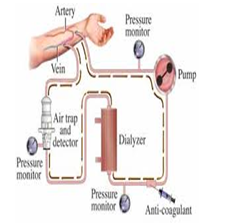Hemodialysis (HD) is the process of cleansing the impurities in the blood of a patient having severe decline in kidney function with the help of artificial kidney. A patient gets initiated on HD when the kidney function drops to less than below 10-15% and/or he develops symptoms related to advanced renal failure.
What is hemodialysis ?
Hemodialysis (HD) is the process of cleansing the impurities in the blood of a patient having severe decline in kidney function with the help of artificial kidney.
What is the duration of a HD session ?
The usual duration of a HD session is four hours.
When does a patient get initiated on HD ?
A patient gets initiated on HD when the kidney function drops to less than below 10-15% and/or he develops symptoms related to advanced renal failure.
Does HD cure kidney failure ?
No, HD is only a substitute for the excretory function of the kidneys.
What exactly is done during HD ?
During HD, blood is withdrawn from the patient’s body through vascular access (see below) by HD machine, purified with help of artificial kidney (otherwise called dialyzer) and then returned to the patient.
What is the main requirement for HD ?
The main requirement for HD is vascular access.
What is vascular access ?
Vascular access (VA) is the way to get blood out of the body for HD and for subsequent return to the circulation after purification.
Why is it needed for HD ?
For HD to be efficient and effective, blood flow in the order of 250-300ml/minute is required. This cannot be obtained from an ordinary blood vessel and hence the need for a VA.
What are the types of VA ?
The types of VA are temporary and permanent. Temporary accesses are catheters inserted into a large vein and they include internal jugular vein catheter (tube inserted into the neck vein), subclavian vein catheter (tube inserted into the chest vein) and femoral vein catheter (tube inserted into thigh vein). They can be used at once for HD as they are inside veins having high blood flow.
Permanent accesses include arteriovenous (AV) fistula and AV graft. They are surgically created connections between high pressure and low-pressure blood vessels (called artery and vein respectively) in the upper limb. At least 4 – 6 weeks’ time (called maturation period) is required before they can be used for HD (as they undergo an increase in size and thickness associated with increased blood flow during this period).
How do you decide on the type of VA for HD ?
All patients with irreversible kidney disease should ideally undergo permanent VA at least a month before the probable time of requirement of HD. If the dialysis is required on an emergency basis and the patient does not have good functioning permanent access, temporary access is needed.
What are the complications of temporary VA ?
The complications of temporary VA are a) poor blood flow during HD resulting from blockage of the catheter or narrowing or clotting within the vein into which they are inserted; these problems may necessitate change of catheter and/or its location; b) blood stream infections which can make the patient seriously ill if they are not identified and managed early and appropriately.
What are the complications of permanent VA ?
The complications of permanent VA are a) poor blood flow during HD resulting from narrowing or clotting within AV fistula or AV graft; these problems may necessitate creation of new permanent access and also a temporary one for continuation of HD till the new AV fistula or graft gets mature; b) bleeding or swelling at the site of puncture during or after HD; c) rarely swelling of the access limb; d) very rarely infections of the access resulting in blood stream infections which can make the patient seriously ill if they are not identified and managed early and appropriately.
What are the other requirements for HD ?
The other requirements for HD are HD machine, dialyzer, pure water (about 120-150 liters per HD session), dialysis concentrate solution, uninterrupted power supply and anti clotting drug called Heparin (to prevent clotting of blood in the dialyzer and tubing during HD).
For how long will a patient require HD?
In patients with acute kidney failure (scope for reversibility present), dialysis is performed till recovery of kidney function occurs (usually 1-3 weeks). In patients with end stage renal disease, dialysis needs to be performed lifelong or till the patient undergoes kidney transplantation.
What are the common complications during HD ?
Common complications during HD are drop in blood pressure (20-30%), cramps (5-20%), nausea and vomiting (5-15%), headache (5%), itching (5%), chest pain (2-5%), back pain (2-5%), and fever and chills (less than 1%).
What are the less common complications during HD ?
Less common but serious complications include disequilibrium syndrome (failure of the body to get adjusted to removal of waste during HD at the time of initiation), allergic reactions and life threatening events like cardiac arrhythmia, cardiac arrest, bleeding into the brain, fits, hemolysis (breaking down of red blood cells) and air embolism (entry of air into blood stream). However the overall benefits of HD are much greater than these side effects.
What other complications can happen in patients undergoing HD ?
Patients on long term HD can develop anemia, cardiovascular disease, bone disease, problems related to vascular access and viral infections like Hepatitis B and C. The occurrence of viral infections is related to the use of blood transfusion and duration on HD.

